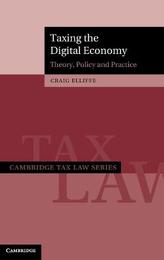
|
Taxing the Digital Economy: Theory, Policy and Practice
Hardback
Main Details
| Title |
Taxing the Digital Economy: Theory, Policy and Practice
|
| Authors and Contributors |
By (author) Craig Elliffe
|
| Series | Cambridge Tax Law Series |
|---|
| Physical Properties |
| Format:Hardback | | Pages:250 | | Dimensions(mm): Height 150,Width 230 |
|
| Category/Genre | Taxation |
|---|
| ISBN/Barcode |
9781108485241
|
| Classifications | Dewey:343.24067 |
|---|
| Audience | | Professional & Vocational | |
|---|
| Illustrations |
Worked examples or Exercises
|
|
Publishing Details |
| Publisher |
Cambridge University Press
|
| Imprint |
Cambridge University Press
|
| Publication Date |
13 May 2021 |
| Publication Country |
United Kingdom
|
Description
The question of how to tax multinational companies that operate highly digitalised business models is one of the most contested areas of international taxation. The tax paid in the jurisdictions in which these companies operate has not kept pace with their immense growth and the OECD has proposed a new international tax compromise that will allocate taxing rights to market jurisdictions and remove the need to have a physical presence in the taxing jurisdictions in order to sustain taxability. In this work, Craig Elliffe explains the problems with the existing international tax system and its inability to respond to challenges posed by digitalised companies. In addition to looking at how the new international tax rules will work, Elliffe assesses their likely effectiveness and highlights features that are likely to endure in the next waves of international tax reform.
Author Biography
Craig Elliffe is a Professor of Taxation Law at the University of Auckland. Prior to becoming an academic, he spent twenty-three years as a tax partner for major international legal and accounting partnerships. He was the first New Zealander to be appointed to the Permanent Scientific Committee of the International Fiscal Association and a member of the New Zealand government's 2018/2019 Tax Working Group. His book International and Cross-Border Taxation in New Zealand won international plaudits and the JF Northey prize for the best legal book published in New Zealand in 2015.
Reviews'Professor Elliffe comprehensively discusses the most controversial subject of the current global tax conversation, which challenges the roots of the traditional international tax system. A fine work and a must-read book.' Robert Danon, Professor of Law at the University of Lausanne and Chairman of the Permanent Scientific Committee of the International Fiscal Association (IFA) 'This outstanding book covers the hottest topic in international taxation, and both countries and international organizations are in the process of rapidly changing the rules. Under these circumstances, plus a global pandemic, it is very hard to do what Craig Elliffe has successfully done: to produce an eminently readable, short, and accurate summary of both the current state of affairs and its historical origins, going back a century to the original 1920s compromise that created the international tax regime (ITR).' Reuven Avi-Yonah, Irwin I. Cohn Professor of Law, University of Michigan 'A truly global tax book - presenting a holistic view of the tax issues of the digital economy built on wide-ranging comparative and foundational research.' Wolfgang Schoen, Director of The Max Planck Institute for Tax Law and Public Finance, Munich 'Taxation of the digital[ised] economy is the current focus of the international tax world's attention. The first part of this book explains the historical background and the challenges to the current tax regime. The second part examines the OECD proposals (as they stood in early 2020), and various alternatives including DBCFTs and DPTs, as well as unilateral DSTs. Whatever becomes of the OECD project, the discussion here will remain valuable as a resource and guide.' Philip Baker QC, Gray's Inn and Oxford University, author of Double Taxation Conventions 'Professor Craig Elliffe's book is one of the first independent and comprehensive works of scholarship to seriously analyse these challenges, the political process that dominates the work on them within the international tax regime, and the concrete proposals to resolve them. The book is an important and timely resource for whomever wishes to study the issue.' Yariv Brauner, BTR 'There is no 'hotter' topic on the agenda of the international tax regime than the taxation of the digital economy ... The book is an important and timely resource for whomever wishes to study the issue.' Yariv Brauner, British Tax Review
|